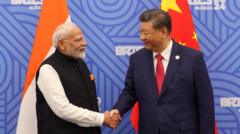Despite ongoing tensions, renewed dialogues and economic interests could pave the way for more cooperative relations between the two nations.
**India-China Relations: Modi Hopes for Improved Ties Amid Geopolitical Tensions**

**India-China Relations: Modi Hopes for Improved Ties Amid Geopolitical Tensions**
Prime Minister Modi's recent comments signal a potential thaw in India-China relations following years of border disputes.
In a recent interview, India's Prime Minister Narendra Modi expressed optimism about improving ties with China, a country that has historically been viewed as a rival. Modi's comments about the normalization of relations, especially concerning the contentious India-China border, come in the wake of high tensions that erupted after a deadly clash in Ladakh in 2020.
Chinese Foreign Ministry spokesperson Mao Ning welcomed Modi's remarks, suggesting that both nations should work together for mutual success. This shift is remarkable considering the backdrop of strained relationships between the two countries following the 2020 altercation, which was the most severe since the 1962 conflict.
While Modi's call for a closer partnership with China may seem ambitious, it reflects newfound optimism in bilateral ties, which have been gradually improving. Trade remains a bright spot, with China being India's top trading partner, as both nations cooperate within platforms like BRICS and the Asian Infrastructure Investment Bank.
In an interesting development, despite the tense atmosphere, military discussions between the two countries have continued, leading to an agreement in October to recommence border patrols. Modi also met Chinese President Xi Jinping at a BRICS summit in Russia, where both leaders pledged to enhance cooperation. The two nations even initiated plans to resume direct flights early in the year.
However, the India-China relationship remains fraught with challenges, including alliances and security ties with competitor countries. India's partnership with the U.S. and China's alliance with Pakistan continue to complicate matters. Additionally, China opposes India's stance on neighboring Kashmir and obstructs India's ambitions to join influential groups like the Nuclear Suppliers Group or secure a permanent seat on the UN Security Council.
Tensions have also been exacerbated by India's strengthening ties with Taiwan and military sales to Southeast Asian nations, actions that China perceives as threats to its regional dominance.
Looking ahead, several factors will influence the future trajectory of India-China relations. Significant territorial disputes still exist, with approximately 50,000 square miles of territory remaining contested along a 2,100-mile border. Continued high-level dialogues and confidence-building measures are crucial for restoring trust.
Future engagements between Modi and Xi are pivotal, especially as these leaders prioritize personal diplomacy. Scheduled summits such as BRICS and G20 provide opportunities for leaders to engage further. Additionally, Chinese investment could play a significant role in strengthening economic relations and offsetting India's trade deficit with China.
Regional political developments may also affect the dynamic. Recent leadership changes in countries neighboring India have leaned more towards China, yet these nations are balancing their relations with both giants. Moreover, a potential cooling of China’s partnership with Russia could provide an opening for India.
The evolving relationship between India and China, the largest countries in Asia, remains complex. While competition is inevitable, recent diplomatic gestures and underlying economic interests could foster a more stable partnership, making Modi's hopeful words not just diplomatic niceties but a reflection of a deeper potential for cooperation.
Chinese Foreign Ministry spokesperson Mao Ning welcomed Modi's remarks, suggesting that both nations should work together for mutual success. This shift is remarkable considering the backdrop of strained relationships between the two countries following the 2020 altercation, which was the most severe since the 1962 conflict.
While Modi's call for a closer partnership with China may seem ambitious, it reflects newfound optimism in bilateral ties, which have been gradually improving. Trade remains a bright spot, with China being India's top trading partner, as both nations cooperate within platforms like BRICS and the Asian Infrastructure Investment Bank.
In an interesting development, despite the tense atmosphere, military discussions between the two countries have continued, leading to an agreement in October to recommence border patrols. Modi also met Chinese President Xi Jinping at a BRICS summit in Russia, where both leaders pledged to enhance cooperation. The two nations even initiated plans to resume direct flights early in the year.
However, the India-China relationship remains fraught with challenges, including alliances and security ties with competitor countries. India's partnership with the U.S. and China's alliance with Pakistan continue to complicate matters. Additionally, China opposes India's stance on neighboring Kashmir and obstructs India's ambitions to join influential groups like the Nuclear Suppliers Group or secure a permanent seat on the UN Security Council.
Tensions have also been exacerbated by India's strengthening ties with Taiwan and military sales to Southeast Asian nations, actions that China perceives as threats to its regional dominance.
Looking ahead, several factors will influence the future trajectory of India-China relations. Significant territorial disputes still exist, with approximately 50,000 square miles of territory remaining contested along a 2,100-mile border. Continued high-level dialogues and confidence-building measures are crucial for restoring trust.
Future engagements between Modi and Xi are pivotal, especially as these leaders prioritize personal diplomacy. Scheduled summits such as BRICS and G20 provide opportunities for leaders to engage further. Additionally, Chinese investment could play a significant role in strengthening economic relations and offsetting India's trade deficit with China.
Regional political developments may also affect the dynamic. Recent leadership changes in countries neighboring India have leaned more towards China, yet these nations are balancing their relations with both giants. Moreover, a potential cooling of China’s partnership with Russia could provide an opening for India.
The evolving relationship between India and China, the largest countries in Asia, remains complex. While competition is inevitable, recent diplomatic gestures and underlying economic interests could foster a more stable partnership, making Modi's hopeful words not just diplomatic niceties but a reflection of a deeper potential for cooperation.





















